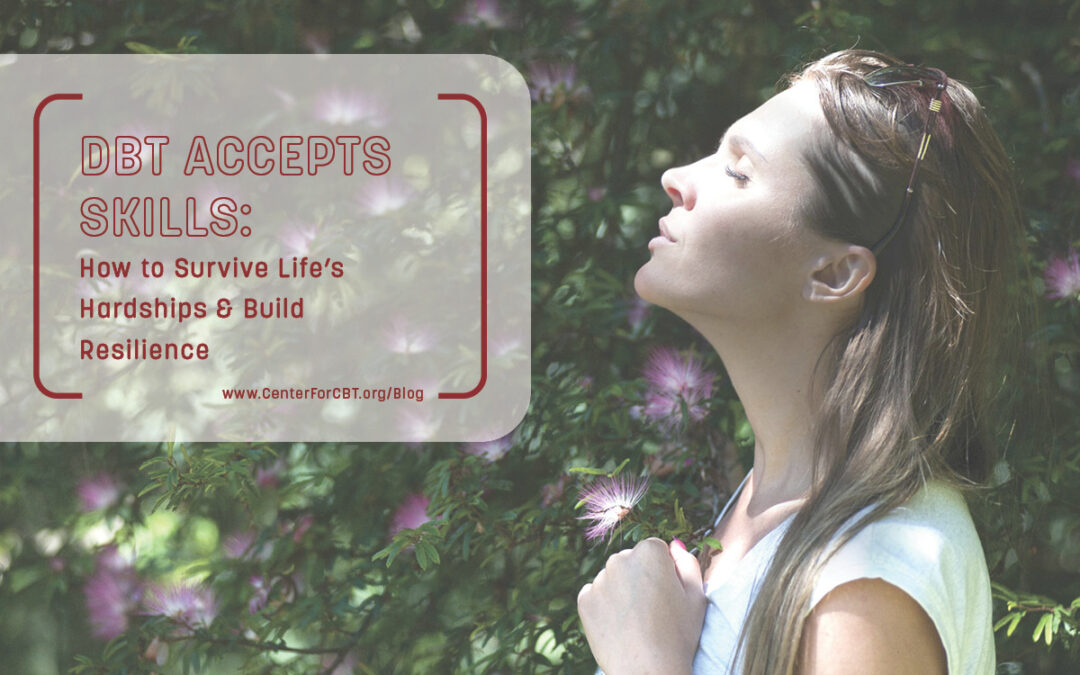Everyone experiences painful emotions, even intense ones. Breakups, illnesses, anxieties, and failures— both big and small— can cause them. At times, we’re faced with problems that seem insurmountable. A solution may not be available right away. An issue we poured our energy, time, and hearts into is just not getting any better. Now, we’re stuck sitting in distress and feeling things like shame, sadness, and anxiety.
Dialectical Behavior Therapy (DBT), is an evidence-based treatment for people who struggle with intense emotions and behavior. It has a set of skills called Distress Tolerance. These skills are invaluable during crises. They help us navigate through challenging situations without exacerbating them. Or, in other words, without “making things worse.”
Need tools to pause distress? Schedule an ACCEPTS-focused session.
Think of this as being stranded in the ocean (crisis). Your only focus is on staying aboard your life raft and paddling (distress tolerance) until you can make it to shore (where you can then problem-solve further). If in your understandable distress you instead start screaming, crying, and punching the floor of your life raft in despair, it could make things worse. That reaction will not help you focus on surviving and tolerating the distress until you reach land.
What is the DBT Distress Tolerance Skill of ACCEPTS?
The set of distress tolerance skills that can help you navigate challenging life experiences are called Distract with Wise Mind “ACCEPTS.” The ACCEPTS title is actually a handy acronym to remember these strategies: Activities, Contributing, Comparisons, Emotions, Pushing Away, Thoughts, and Sensations. . By practicing these activities, you can learn to use them as your “life raft” and help you tolerate distress in crisis situations:
You can find a detailed explanation of each ACCEPTS skill below. Try out the suggested examples to see what works best for you! For a visually stimulating refresher of these skills, you can also watch the DBT-RU video describing ACCEPTS skills:
Activities: Engaging in Mindful Distractions
Distract by doing. Engage in different activities that are separate from the distressing situation. It’s helpful to choose something that requires concentration. It’s also important to work on being mindful of the activity/immerse ourselves in it as best we can. This could be something like Netflix & chilling, watching funny instagram videos, or playing video games. It can also be something more active such as going for a walk, playing a sport, a board game with friends, or going out for a cup of coffee/tea. You can even do online crossword puzzles, wordle, or sudoku. You can read a book, write in a journal, doodle, go to town on a mindfulness coloring book, or any activity you can think of!
Contributing: Shifting Focus Through Kindness
When we contribute or focus on helping another person, it can help take our minds off how a crisis is affecting us. Be kind by volunteering at local animal shelters, helping a sibling or friend with homework, or surprising a family member or friend with a hug or card. You can think of quick and simple things too. Text someone to tell them something you appreciate about them or send them an encouraging meme.
Comparisons: Fostering Gratitude & Perspective
Some people find it helpful to compare themselves to those in the world less fortunate in some way. Watching reality shows about others’ problems or conflicts could make us feel grateful. For others this can elicit guilt. If that’s the case, consider comparing yourself to a fictional character from a TV show. For example, the kids from Stranger Things being hounded by a Demogorgon or living on Dune with deadly sandworms you haven’t learned how to ride. A different way to use this skill is by comparing our situation now to a time we weren’t coping as well or were “doing worse.” For example, think about a fight with someone close to you where you didn’t handle it well. Perhaps you were screaming and using PG-13 words that ended in door slammings and “I hate yous.” You weren’t being skillful and were in more distress and pain than you are now. Remind yourself of the new coping skills you have learned and how that has helped improve your interactions.
Emotions: Eliciting Emotional Shifts
Do something to create a new emotion that is different from the emotion causing you distress. For example if you’re extremely angry, you can watch a horror or action film that elicits excitement. If you’re feeling strong sadness, you might listen to soothing or upbeat music. If you’re anxious, you could consider watching a film that makes you feel happiness and/or sadness (Pixar and Disney movies can often do both!).
Pushing Away: Temporarily Setting Aside Painful Thoughts
We stress temporarily. Remember, these skills are aimed at surviving an immediate crisis. You may need to push away painful thoughts and emotions to get through the moment. You can imagine putting your pain in a box and placing it on an imaginary shelf for 15 minutes. Or, you could jot a note about the situation on a piece of paper and put it in your pocket; leave it there until you have time to take it out and feel it. Try to leave the situation mentally for some time and remind yourself that it’s important to come back to it when you are less distressed and able to better assess, feel, and tolerate the emotions.
Thoughts: Engaging in Mental Distractions
This strategy is about changing your thoughts. Mentally occupy your thoughts with other things to take up your mind space. You can sing all the lyrics to your favorite song in your head or count the number of tiles on the floor. Or, name a famous person for every letter of the alphabet from A to Z. You could even do multiplication tables in your head! The list goes on. Try to notice when your mind is ruminating (fixating on a situation/focusing on painful thoughts over and over) and yell “NO!”
Sensations: Redirecting Focus with Physical Sensations
Intensifying other physical sensations (sight, smell, tastes, touch, hearing) in a safe way can distract you and help you focus on a strong sensation versus your pain. Hold an ice cube, warm up a heating pad for your stomach, eat a sour candy, bite into ginger or lemon, take a hot shower, squeeze a rubber ball very hard.
Applying DBT ACCEPTS Skills to Improve Your Life
Learning how to distract yourself from painful emotions and situations takes work. It is not always easy to look past the challenges that arise in a crisis situation, and those feelings of distress are normal. The important thing is to have skills you can use in those moments so that you can stay afloat without getting swept away by the feelings of distress. These skills can help put you in the right headspace to effectively problem solve and find healthy ways to cope with your feelings. With practice, you can learn how to apply the DBT ACCEPTS skills to help manage distress in times of crisis.



